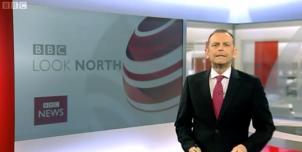Full Freeview on the Chatton (Northumberland, England) transmitter
| Google Streetview | Google map | Bing map | Google Earth | 55.531,-1.835 or 55°31'52"N 1°50'7"W | NE67 5JD |
The symbol shows the location of the Chatton (Northumberland, England) transmitter which serves 29,000 homes. The bright green areas shown where the signal from this transmitter is strong, dark green areas are poorer signals. Those parts shown in yellow may have interference on the same frequency from other masts.
This transmitter has no current reported problems
The BBC and Digital UK report there are no faults or engineering work on the Chatton (Northumberland, England) transmitter._______
Digital television services are broadcast on a multiplexes (or Mux) where many stations occupy a single broadcast frequency, as shown below.
64QAM 8K 3/4 27.1Mb/s DVB-T MPEG2
H/V: aerial position (horizontal or vertical)
The Chatton (Northumberland, England) mast is a public service broadcasting (PSB) transmitter, it does not provide these commercial (COM) channels: .
If you want to watch these channels, your aerial must point to one of the 80 Full service Freeview transmitters. For more information see the will there ever be more services on the Freeview Light transmitters? page.
Which Freeview channels does the Chatton transmitter broadcast?
If you have any kind of Freeview fault, follow this Freeview reset procedure first.Digital television services are broadcast on a multiplexes (or Mux) where many stations occupy a single broadcast frequency, as shown below.
64QAM 8K 3/4 27.1Mb/s DVB-T MPEG2
H/V: aerial position (horizontal or vertical)
The Chatton (Northumberland, England) mast is a public service broadcasting (PSB) transmitter, it does not provide these commercial (COM) channels: .
If you want to watch these channels, your aerial must point to one of the 80 Full service Freeview transmitters. For more information see the will there ever be more services on the Freeview Light transmitters? page.
Which BBC and ITV regional news can I watch from the Chatton transmitter?

BBC Look North (Newcastle) 1.6m homes 6.0%
from Newcastle NE99 2NE, 64km south-southeast (167°)
to BBC North East and Cumbria region - 70 masts.

ITV Tyne Tees News 1.4m homes 5.4%
from Gateshead NE11 9SZ, 64km south (170°)
to ITV Tyne Tees region - 47 masts.
All of lunch, weekend and 50% evening news is shared with Border
How will the Chatton (Northumberland, England) transmission frequencies change over time?
| 1984-97 | 1997-98 | 1998-2012 | 2012-13 | 13 Nov 2019 | |||||
| B E T | B E T | B E T | B E K T | K T | |||||
| C29 | SDN | ||||||||
| C31 | ArqA | ||||||||
| C37 | ArqB | ||||||||
| C39 | BBC1waves | BBC1waves | BBC1waves | +BBCB | |||||
| C41 | SDN | BBCA | |||||||
| C42 | C4waves | C4waves | C4waves | D3+4 | |||||
| C44 | ArqA | D3+4 | |||||||
| C45 | BBC2waves | BBC2waves | BBC2waves | BBCA | |||||
| C47 | ArqB | BBCB | |||||||
| C49tv_off | ITVwaves | ITVwaves | ITVwaves |
tv_off Being removed from Freeview (for 5G use) after November 2020 / June 2022 - more
Table shows multiplexes names see this article;
green background for transmission frequencies
Notes: + and - denote 166kHz offset; aerial group are shown as A B C/D E K W T
waves denotes analogue; digital switchover was 12 Sep 12 and 26 Sep 12.
How do the old analogue and currrent digital signal levels compare?
| Analogue 1-4 | 100kW | |
| BBCA, D3+4, BBCB | (-7dB) 20kW | |
| SDN, ARQA, ARQB | (-10dB) 10kW | |
| Mux 1*, Mux 2*, Mux A*, Mux B* | (-12.2dB) 6kW | |
| Mux C*, Mux D* | (-17dB) 2kW |
Local transmitter maps
Chatton Freeview Chatton DAB Chatton AM/FM Chatton TV region BBC North East and Cumbria Tyne TeesWhich companies have run the Channel 3 services in the Chatton transmitter area
|
|
Is the transmitter output the same in all directions?
Radiation patterns withheldMonday, 5 December 2022
C
Chris.SE2:55 AM
Iain:
There's currently no reported problems for the Chatton transmitter and it's not listed for Planned Engineering.
Have you checked that your aerial looks intact and is still pointing in the correct direction, and that the downlead is secure and not flapping in the wind?
What sort of weather conditions have you been having during the evening?
f you provide a full postcode we might be able to advise is there's any specific issues that affect reception in your locale.
| link to this comment |
Monday, 6 November 2023
K
Ken w moore2:17 PM
Aerial on roof. No freeview in morning until around 9.30 in the morning on tv.
| link to this comment |
C
Chris.SE2:36 PM
Ken w moore:
Can't find any current reports of any recent faults, and the transmitter isn't currently listed for Planned Engineering (though sometimes the lists aren't 100% accurate).
If you have further problems, post back with a full postcode so we can check your predicted reception.
Do check some obvious things such as is your aerial looking intact and still pointing as it was, is the coax secure and not flapping in the wind? Check all accessible coax connections and ensure there's no corrosion or water. Sometimes these sort of problems can affect one multiplex without an observable effect on the others.
| link to this comment |
Select more comments
Your comment please!




